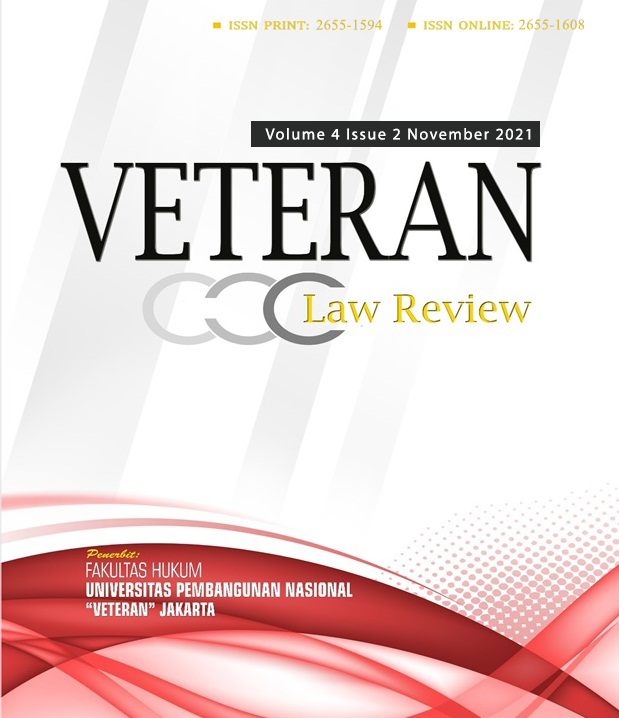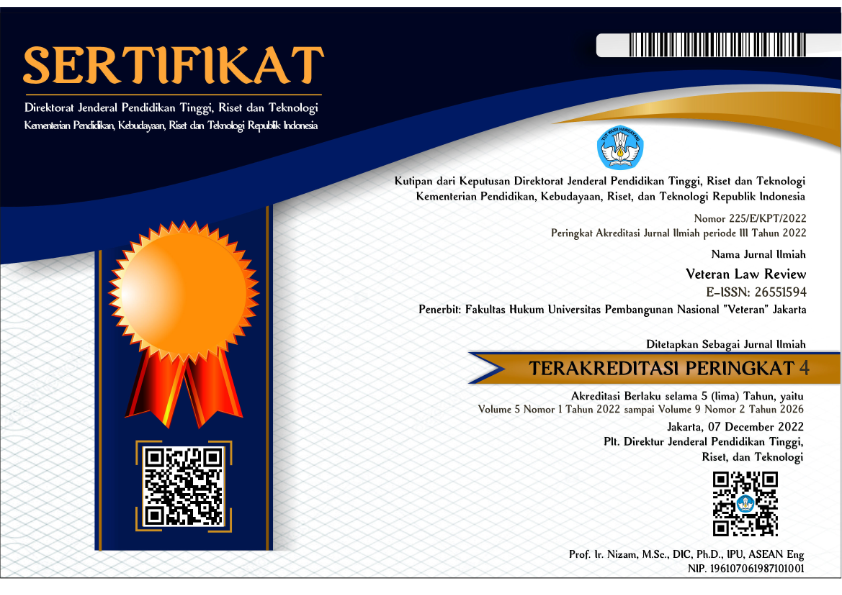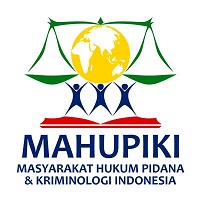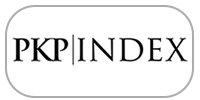Restorative Justice Approach in Crime of Humiliation Through Social Media
DOI:
https://doi.org/10.35586/velrev.v4i2.3013Abstract
The restorative justice approach is a diversion in the handling of criminal acts which in the criminal justice procedure are centered on imposing criminal sanctions which are transferred to a communication and mediation process that presents the perpetrators, victims, families of the perpetrators/victims, and other related parties to come together to realize a form of agreement. for the handling of criminal acts that are fair and proportional to the victims who are harmed and the perpetrators by prioritizing repairs such as initial conditions and restoring a harmonious interaction model in society. It is this restorative justice approach that will be used in the investigation, investigation and examination stages in courts of insults, considering that the enforcement of criminal law against insult cases that occur in the community has not given satisfactory results. The regulation of defamation offenses whether carried out offline or online with social media refers to the provisions of the Criminal Code (KUHP) and the Information and Electronic Transactions Law, which in these two provisions contain criminal sanctions against the perpetrators. The purpose of the restorative justice approach in dealing with insults offenses is the restoration of victims who suffered as a result of the humiliation by providing compensation, imposing social work on the perpetrators and matters mutually agreed upon by the parties.Downloads
References
Eva Achjani Zulfa, 2009. Keadilan Restoratif, Jakarta : Badan Penerbit Fakultas Hukum Universitas
Gomgom TP Siregar. 2020. Suatu Analisis Mengenai Tindak Pidana Pencemaran Nama Baik Melalui Media Elektronik. Bandung : Refika Aditama
Johnny Ibrahim, (2008). Teori dan Metodologi Penelitian Hukum Normatif, Malang: Banyumedia publishing
Leden Marpaung, 2010. Tindak Pidana Terhadap Kehormatan, Jakarta: Sinar Grafika,
Marlina. 2010. Pengantar Konsep Diversi dan Restorative Justice Dalam Hukum Pidana. Medan : USU Press
Mukti Fajar ND dan Yulianto Achmad. 2010. Dualisme Penelitian Hukum Normatif & Empiris. Yogyakarta : Pustaka Belajar
Muladi. 2015. Kapita Selekta Sistem Peradilan Pidana. Semarang : BP Universitas Diponegor
Peter Mahmud Marzuki. 2010. Penelitian Hukum, Jakarta : Kencana
R, Soesilo. 1996. Kitab Undang-Undang Hukum Pidana Serta Komentar-Komentar Lengkap Pasal Demi Pasal. Bogor : Politeia
Syamsul Arifin. 2011. Falsafah Hukum. Medan : Uniba Press
S Soekanto, (1995. Penelitian Hukum Normatif suatu tinjauan singkat, Jakarta: Raja Grafindo Persada,
S Soekanto (2) 1998. Metodologi Research, Yogyakarta : Andi Offset
Teguh Prasetyo & Abdul halim Barkatullah. 2005. Politik Hukum Pidana Kajian Kebijakan Kriminalisasi dan Dekriminalisasi, Yogyakarta : Pustaka Belajar
Zaidan, M. A. 2015. Menuju Pembaharuan Hukum Pidana. Jakarta: Sinar Grafika
Website Material:
Erizka Permatasari. (2021). Penanganan Pencemaran Nama Baik di Medsos Harus Mengedepankan Restorative Justice. Diakses melalui website https://images.hukumonline.com/frontend/lt5f8445b8eca72/lt5f854ca34b378.png
Gerald Saratoga Sarayar dan Tasha Kartika Larasati. (2021). Penyelesaian Tindak Pidana Dalam Undang-Undang Informasi dan Transaksi Elektronik Berdasarkan Prinsip Keadilan Restoratif from website https://fjp-law.com/id/penyelesaian-tindak-pidana-dalam-undang-undang-informasi-dan-transaksi-elektronik-berdasarkan-prinsip-keadilan-restoratif-restorative-justice/
Joshua Sitompul. (2018). Pencemaran Nama Baik di Sosial Media Delik Biasa atau Aaduan. Diakses melalui website https://new.hukumonline.com/klinik/detail/ulasan/lt520aa5d4cedab/pencemaran-nama-baik-di-media-sosial--delik-biasa-atau-aduan/
Magazine / Newspaper Articles:
Barda Nawawi. (1996). Batas-Batas Kemampuan Hukum Pidana Dalam Penanggulangan Kejahatan, Makalah Seminar Nasional Pendekatan Non Penal Dalam Penangulangan Kejahatan, Semarang : Graha Santika Hotel
Downloads
Published
How to Cite
Issue
Section
License
Copyright (c) 2022 Veteran Law Review Journal
Veteran Law Review © 2022 by Faculty of Law Universitas Pembangunan Nasional "Veteran" Jakarta is licensed under Creative Commons Attribution 4.0 International

1. License
The non-commercial use of the article will be governed by the Creative Commons Attribution license as currently displayed on Creative Commons Attribution 4.0 International.
2. Author(s)' Warranties
The author warrants that the article is original, written by the stated author(s), has not been published before, contains no unlawful statements, does not infringe the rights of others, is subject to copyright that is vested exclusively in the author, and free of any third party rights, and that any necessary written permissions to quote from other sources have been obtained by the author(s).
3. User/Public Rights
VELREV's spirit is to disseminate articles published are as free as possible. Under the Creative Commons Attribution-ShareAlike 4.0 International License. VELREV permits users to copy, distribute, display, and perform the work for non-commercial purposes only. Users will also need to attribute authors and VELREV to distributing works in the journal and other media of publications.
4. Rights of Authors
Authors retain all their rights to the published works, such as (but not limited to) the following rights;
- Reproduce the work
- Prepare derivative works based upon the work
- Distribute copies of the work
- Perform the work publicly
- Display the work publicly
- Copyright and other proprietary rights relating to the article, such as patent rights,
- The right to self-archive the article,
- The right to enter into separate, additional contractual arrangements for the non-exclusive distribution of the article's published version (e.g., post it to an institutional repository or publish it in a book), with an acknowledgement of its initial publication in this journal (Veteran Law Review).
5. Co-Authorship
If the article was jointly prepared by more than one author, any author submitting the manuscript warrants that he/she has been authorized by all co-authors to be agreed on this copyright and license notice (agreement) on their behalf, and agrees to inform his/her co-authors of the terms of this policy. VELREV will not be held liable for anything that may arise due to the author's internal dispute. VELREV will only communicate with the corresponding author.
6. Royalties
Being an open accessed journal and disseminating articles for free under the Creative Commons license term mentioned, author(s) are aware that VELREV entitles the author(s) to no royalties or other fees.
7. Miscellaneous
VELREV will publish the article (or have it published) in the journal if the article’s editorial process is successfully completed. JOSI's editors may modify the article to a style of punctuation, spelling, capitalization, referencing, and usage that deems appropriate. The author acknowledges that the article may be published so that it will be publicly accessible and such access will be free of charge for the readers as mentioned in point 3.


















